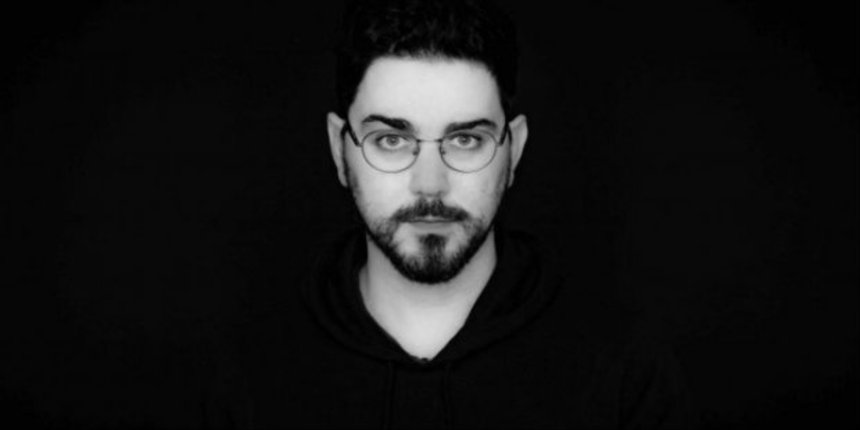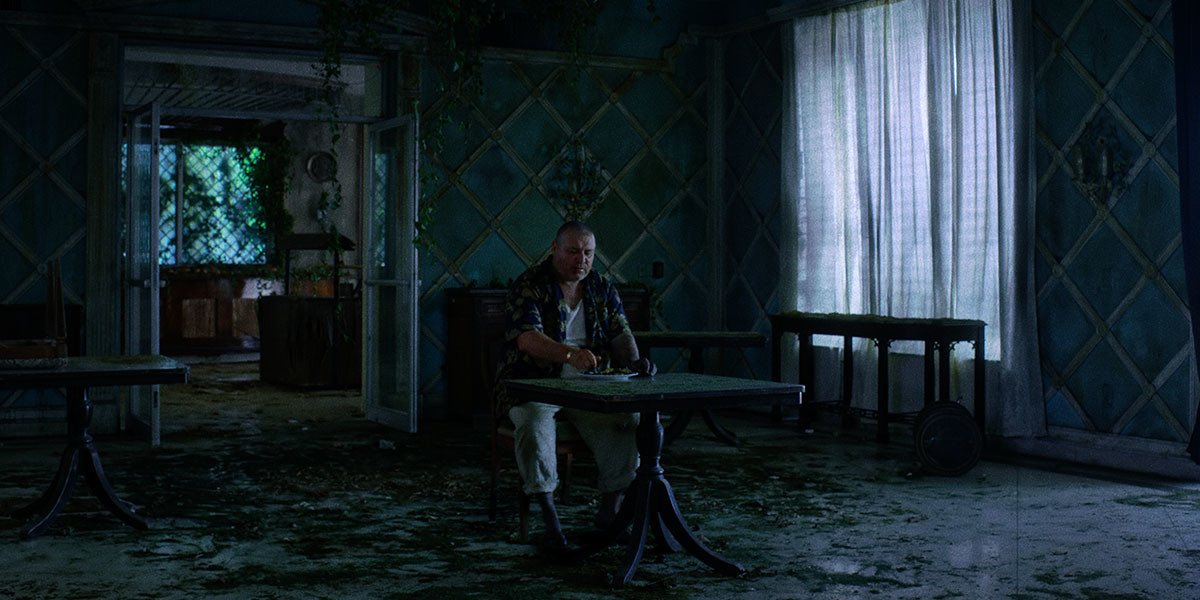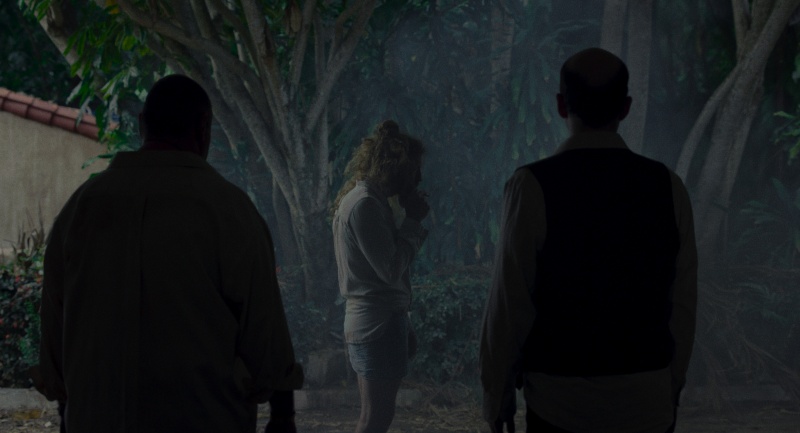Rotterdam 2018 Interview: Ian Lagarde Talks ALL YOU CAN EAT BUDDHA

Canadian filmmaker Ian Lagarde´s first feature-length project as writer-director, All You Can Eat Buddha, is a surreal fable anchored in an all-inclusive tropical resort. Social satire and subversive spiritual allegory hides a deadpan comedy within. ScreenAnarchy had a chance to meet with the filmmaker in Rotterdam to talk more about the film, its style, influences and philosophy.
ScreenAnarchy: Would you consider your tenure as a cinematographer as a training for being a director? At what point did you realize you want to be a director and why?
Ian Lagarde: Pretty much at the same time. I did some acting when I was a kid, enough to be really captivated by the camera and the electric atmosphere that reigned on set. I was definitely going to work in the field. I started still photography when I was 12. And I wrote a lot, so I figured if you combined the two, you could get a film and it started there. I was also very much into graphic novels, comics and literature, so all of these gave me a sense of the dramatic and surreal. My idols were a varied mix of painters, writers, drawers, photographers and filmmakers that have all coalesced somewhere in my brain and formed into some sort of artistic consciousness. At least that's what I like to think.
During your career, was there something like a formative experience whether it is in a relation to being a director or cinema and art in general since you have been around the cameras for some time now being a child actor?
The first time I put my eye in a 35mm motion picture camera, without question. What a magical object! I've only had the opportunity to shoot one feature film on 35mm, Vic+Flo Saw a Bear by Denis Côté, and it was the most rewarding experience ever. It felt like coming full circle.
You said you refuse morals in filmmaking and art. Why?
Because I can't stand people preaching in real life and I hate it even more in a film. I enjoy films that put you in a parallel state of mind, realistic or not, where good and evil are irrelevant. Of course, archetypes can be very interesting to work with and use as character foundations, so long as they aren't simply representations. There has to be some kind of mystery, giving answers according to a coherent message is extremely suspicious to me. It means people hold certitudes and to me, being certain about anything is naive. Living in perpetual doubt isn't necessarily relaxing either.
What led to the All You Can Eat Buddha being your first directing feature-lenght effort? How did the project come about and what were the primary impetuses for the story?
I was reading Siddartha by Herman Hesse in a Mexican all-inclusive waterpark. I travelled with a friend and this was our gringo day. I was not and still am not a fan of all-inclusive resorts, although I can understand why people go there. The thought came to me suddenly and irrevocably: illustrating the Buddha's path in the absurd context of an all-inclusive resort would be perfect in so many ways. Mixing the book's spiritual kitsch with the resort's profane kitsch seemed like the perfect combination to me. Also, capitalism seems to have the capacity to perpetually recuperate everything that tries to go against it, from revolutions to alternative ideas, from counter-culture to mainstream conservatism, which gives it an almost supernatural ability to shapeshift, accept change and „reincarnate" itself in an eternal system of assimilation of ideas.
Did you have a clear vision what are you going to shoot or did it evolve on the go?
When I work with a cinematographer, it's exactly like casting an actor: once they are chosen, you trust them to interpret your vision. But like actors, you direct them and try to point them in the direction you want. Also, when I direct, I want to concentrate on the actors and especially don't want to get lost in the technical aspects of the image, which I definitely get into when I shoot someone else's film.
I did have a clear vision, the zooms were planned in advance, for many reasons, mainly because the resort felt like a place that called for zooms: it is a sort of soviet-leisure relic from the 70's and the film needed to feel like it belonged to an amorphous period of time, even if it is definitely not a period piece. But shooting in Cuba, where people need to be extremely resourceful in order to survive meant that the vision definitely had to be adapted, sometimes quite dramatically. But that's the name of the game: adapt or die. And sometimes, it made things way better than they originally were intended to be!
Is All You Can Eat Buddha religious or spiritual film?
I am not a religious person at all. At most, I would qualify as an agnostic. I was raised by a very atheist dad and a very spiritually-opened mother. I really hate it when people or systems put what is the highest mystery in boxes. If it can fit in the religous box, it does not hold the same power of fascination over me. But I am very interested in the mystical experience and how it shapes people and cultures, the need to believe and the „leap of faith" are perpetual sources of inspiration for me. Anything that tries to boil it down to a digestible explanation and principles annoys the fuck out of me and I'll never let my life be guided by some dudes who wrote some books centuries ago. Or last week, for that matter. I am very suspicious of anyone who pretends to hold the truth. It is the manifestations of the mystic or of people's spirituality that interest me. Come to think of it, these considerations will be the same in the three next projects I have lined-up, although they will be shown in quite different formats than AYCEB.

Several other filmmakers did link corporeality to spirituality. I wonder what were your motivations for this binary?
It is the most ancient preoccupation; the supposed division between body and soul, nature and culture, instincts and civilisation, religious and secular. I don't know precisely, or I've forgotten. You spend so much time writing and explaining something that your intentions, justifications and inspirations can become quite confusing. Maybe because I am constantly preoccupied by that link. On the one hand, I proudly indulge in a number of earthly vices on a very regular basis, on the other, I meditate a lot and try to abstract myself from myself and the world as frequently as possible, if not simply to renew my point of view.
The basic setup of you debut is quite intriguing: exotic resort, overweight Messiah, food. The sum of these parts produces tropical-magical realism inducing realism without being phantasmagoric. What went into developing this brand of civil surrealism?
Instinct. Honestly, this is how I think. I like for surrealism to be anchored in something that feels kind of real, at first, but soon goes off the rails, never to come back. It is a way to play with the familiar and the strange and trying to combine the two.
I believe your knack for photography must played a crucial role since many of the scenes and shots show photographic quality in terms of composition and how meaning is conveyed in a still image since you frequently work with details and close-ups.
Thank you. I guess I wanted to play with the postcard aesthetic and subvert it. I do love subversion. To me, it is the most interesting way to comment on something. I guess it comes back to the question about morals; I would much rather have irony and satire than preaching and obvious, deliberate messages.
The acting register veers towards deadpan and at some moments, characters have this air of alienation and distance. I will shy away making comparisons with Yorgos Lanthimos. Can you elaborate more on this stylistic preference leading your actors ?
I fucking love Yorgos Lanthimos. On my part, the way I play with actors depends on the script and atmosphere. For this project, I wanted the reality to feel familiar and otherwordly and timeless at the same time. Also, the actors came from France, Cuba and Québec, with a range of styles that made it more interesting to bring them together in this weird, varying tone. It was one of the biggest challenges of this film, finding the tone.
What was the casting process like? What were your demands on actors to succesfully pull the scenes and did the potential actors have a problem understanding script since the film meaning is mostly conveyed through image than words?
It was a long process, because actors who can silently convey meaning are hard to find and often aren't the same who can process long monologues in a convincing way, although the best are obviously good at both, which is what we were looking for.
All You Can Eat Buddha uncoils in the vein of a cryptic puzzle film. Do you have favourite cryptic puzzle films?
Many, they are the most interesting ones to me. Lanthimos is a specialist and constant inspiration, Lynch, Jodorowsky, Kubrick, Weerasethakul, Teshigahara, Dreyer, Laughton, Tarkovsky, Pasolini... I have such a shitty memory that it is hard to remember which ones especially influenced the film. While writing, I noticed that there were many links to be made with Teorema by Pasolini and possibly Visitor Q by Miike, where a stranger bursts into a context and acts as a catalyst for other people's pulsions and instincts. So I guess these could be seen as influences, althought they weren't conscious. Soy Cuba by Kalatozov had a huge impact on me, when it was reedited. And although the impressive form wasn't I wanted for this film, or even had the means to try to do.
I feel like the very strange tone has definitely been an influence on the film and to me, I think Cuba's revolution could be the coming „storm" outside All You Can Eat Buddha's resort. At the very least, it strongly nourished my reflexion, especially as any and all revolutions seem to be assimilated by the religion of capital.

Besides the spiritual allegory there seems to be a hidden a socio-political layer in the film´s rich tapestry. Does that rely somewhat to dictatures doubling as tropical paradises such as Cuba?
Even if the parallels with Cuba are obvious and the island's vibe and people have influenced and permeate every frame, I very specifically wanted the film to be set in a generic resort island. It is not a film about Cuba, specifically. I have complex feelings about the country, I truly respect many things about their system and disagree with other things about the way it is being put in practice. But most of all, I deeply admire the people's strength, resilience, invention and contagious energy. They have been under embargo for sixty years and still found a way to survive better than most. To me, the film comments much more on post-colonialism and capitalism as sources of fascination, blind admiration and a quasi-religious devotion.
What would be reason for mingling spiritual allegory with politics?
They are one and the same, a game of mise-en-scène, a dance, a way to play with people's need to believe and submit to something greater than themselves. Barely anyone questions the way things are done on the political spectrum, anymore. And people who do are shunned to the sidelines. I see no difference between the two; for most people, they are systems of belief; with prophets, self-affirming stories and crystalized dogma.
The change of administrative in the film is such a Kafka moment however you went for more biblical turn with an apocalypse. Spiritual and political intertwine and the scene in the film reminded me of these apocalyptic prophecies by economic pundits about the fall of capitalism and the mess that will follow. Does All You Can Eat Buddha straddle this meaning? After all, its hard to overlook the all-you-can-eat buffet as a parable to over-consumerism but since it is a luxurious resort, the wealth is only for top-percenters.
Apocalypse is destrucation and renewal, right? Barring a real-world nuclear holocaust, which the morons-in-chief seem to be pushing for right now, I think these systems will perpetually reproduce themselves, assimilating dissent. I don't know if it's a bad or good thing, probably somewhere in the middle. Like I said, I relish doubt and am suspicious of certitudes. I have politcal opinions, but this film is not a vessel for them, I felt like it needed to stay general, reflecting at most on very general terms, the perpetual reproduction of power dynamics, the omnipresence of sexuality, the dominance of irrationality even in our thought systems. If this doesn't seem like it makes sense, it's probably because it doesn't.
As a fan of Jodorowsky, I really digged the dirty pictures made by a cleaning room lady and they had this sort of occult yet playful essence. Furthermore, they embody the binary of spiritual and corporeal rather effectively. What is the story behind them?
I wanted a cute way to illustrate the intensity of Mike's sexual encounters with people. I really love Louise Bourgeois's work, her drawings in particular. It was a way to convey voyeurism, a certain form of surveillance, anyone who's been in an all-inclusive resort will have noticed that it is a very organized Panopticon, in a sweet way that also conveyed Esmeralda's more and more mystical fascination with Mike.
You are already working on a Canadian film set 400 years ago. How does the work continue?
I don't know how you found out about that, but I switched to other projects, although I would really be into exploring this period-piece eventually. It is about the first true self-made man of Canada, and possibly America. He was quite psychotic.






